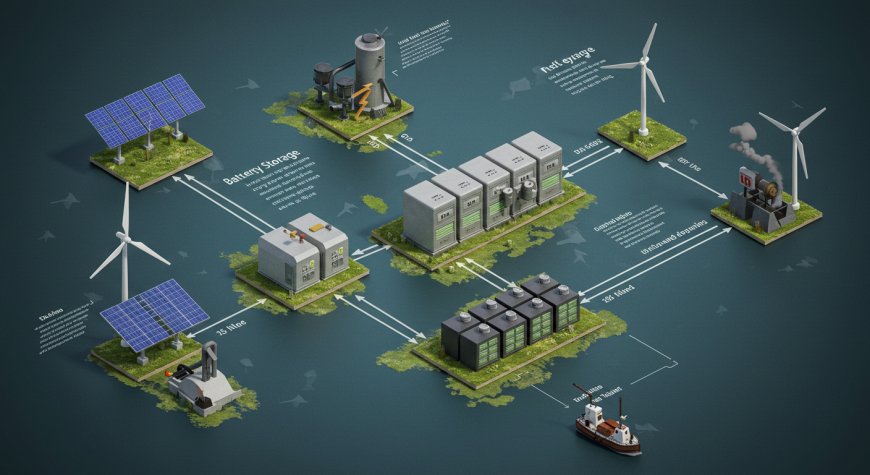How Battery Storage Systems Are Changing the Energy Market
Discover how battery storage systems are revolutionizing the energy market. Learn how they work, real-life benefits, top brands, ROI, and expert tips to choose the right one.

Let me take you back to one summer afternoon when my air conditioning gave up mid-heatwave. The culprit? A local blackout. I realized that even with my fancy solar panels, I was still relying on the grid for storage. That day, I started researching battery storage systems and now, Im here to tell you how theyre shaking up the entire energy market.
Battery storage isnt just a buzzword. It's quietly revolutionizing everything from how we power our homes to how utility companies balance the grid. If you're even remotely curious about how energy works in the modern world or just want to lower your electric bill buckle up. This ones for you.
What Are Battery Storage Systems?
Battery storage systems store energy for later use. They work by collecting excess energy (from sources like solar panels or the grid during off-peak times), storing it, and releasing it when needed.
Think of them as the pantry of your energy system. You stock up when food (energy) is cheap or plentiful, and eat from it when food (power) is scarce or expensive.
How They Work Simplified
In basic terms:
-
Charge phase: Energy flows into the battery either from your solar panels, wind turbine, or the grid.
-
Storage phase: The battery holds onto this energy like a power bank.
-
Discharge phase: When your home or facility needs power (especially when the sun isnt shining), the battery releases that stored energy.
I installed one at home (a Tesla Powerwall, if you're curious), and it felt like having a safety net. Suddenly, I wasnt worried about cloudy days or peak-time electric rates.
Why Battery Storage Systems Matter
Heres where things get interesting.
For Homeowners
In my experience, adding a battery storage system to my solar setup was like turning a one-way road into a two-way street. I could finally use the energy I produced not just send it to the grid for pennies and buy it back later at higher rates.
Benefits include:
-
Energy independence: Youre less reliant on the grid.
-
Bill savings: You can use stored energy during peak pricing times.
-
Backup power: Outages become non-issues.
For Utility Companies
Utilities are investing big in grid-scale battery storage. Why?
-
Load balancing: Store energy during low demand, release during high demand.
-
Renewables integration: Smooth out the inconsistencies of wind and solar.
-
Grid reliability: Prevent blackouts and voltage drops.
One utility company in California now uses battery storage to replace peaker plants those dirty, expensive fossil-fuel plants that only run during extreme demand.
Real-World Applications and Use Cases
Residential Use
Thats me and maybe you. You install a battery in your garage or basement, hook it up to your solar system, and enjoy clean, reliable energy. Popular options:
-
Tesla Powerwall
-
LG Chem RESU
-
Enphase IQ Battery
Ive personally used the Powerwall, and the mobile app makes it ridiculously easy to monitor and manage.
Commercial and Industrial Use
Businesses are leveraging battery storage to reduce demand charges and keep operations running during grid hiccups. When I visited a local data center using a large-scale battery array, I was blown away by how quiet and compact the setup was.
Grid-Level Storage
Were talking giant battery farms. These can power thousands of homes for hours and are especially helpful when the sun sets or wind dies down. States like California and Texas are leading the way.
Mini Buyers Guide: Choosing the Right Battery Storage System
When I was choosing my battery, I felt overwhelmed. Heres what I wish someone had told me.
Key Factors to Consider
-
Battery Capacity (kWh)
-
This determines how much energy your battery can store. Think of it like your fuel tank.
-
-
Power Rating (kW)
-
Tells you how much electricity can be delivered at once. Higher = more appliances at once.
-
-
Depth of Discharge (DoD)
-
How much of the batterys capacity you can use. Aim for 90%+.
-
-
Round-trip Efficiency
-
How much energy is lost in the storage process. Look for 90%+.
-
-
Warranty
-
A good battery should last 10 years minimum.
-
Top Brands I Researched
| Brand | Capacity Range | Warranty | Notable Feature |
|---|---|---|---|
| Tesla Powerwall | 13.5 kWh | 10 years | App-controlled, sleek design |
| LG Chem RESU | 9.816 kWh | 10 years | Compact, modular |
| Enphase IQ | 3.510.5 kWh | 10 years | Great for Enphase systems |
Financial Incentives and ROI
Lets talk dollars and cents because this stuff aint cheap upfront.
Federal Incentives
-
Investment Tax Credit (ITC): As of 2025, you can deduct 30% of your battery storage costs from your federal taxes (if paired with solar, and in some cases even without).
State-Level Incentives
States like California, Massachusetts, and New York offer rebates and performance-based incentives. In California, the SGIP rebate knocked $3,000 off my system.
Return on Investment (ROI)
Depending on your electricity rates, solar output, and incentives, a system can pay for itself in 510 years. Mine is projected to break even in 6.5 years.
Challenges and Limitations
Of course, its not all sunshine and stored power. Some limitations I ran into:
High Upfront Cost
Batteries cost $7,000$15,000, installed. Financing options help, but its an investment.
Limited Lifespan
Most batteries last 1015 years. After that, performance degrades, and replacement might be necessary.
Space and Compatibility
Some homes may not have the right space or solar setup for a seamless battery integration.
The Future of Battery Storage
The industry is booming. Globally, battery storage capacity is expected to grow tenfold by 2030. And were not just talking lithium-ion solid-state, flow batteries, and even hydrogen storage are on the horizon.
In fact, companies like Form Energy are working on iron-air batteries that can power homes for days a real game-changer if it works.
Helpful Tips Before You Buy
-
Do a home energy audit: Understand your usage patterns first.
-
Compare installers: Dont settle on the first quote.
-
Ask about monitoring tools: Apps make life easier.
-
Plan for expansion: Choose systems that allow additional batteries later.
FAQs: Battery Storage Systems
Do I need solar panels to use a battery storage system?
Nope! While they work beautifully together, you can charge your battery from the grid and use it during peak times.
H3: Will a battery save me money?
Yes especially if your utility uses time-of-use (TOU) pricing. You store cheap energy and use it when prices spike.
How long can a home battery power my house?
Depends on the battery size and what you run. A 13.5 kWh battery (like the Powerwall) can run essentials for 2448 hours.
Are battery systems safe?
Very. Most come with built-in thermal protection and certifications. Just make sure its installed by a licensed professional.
Can I go completely off-grid?
With enough solar panels and multiple batteries, yes. But its expensive and complex. Hybrid systems (grid + battery + solar) offer the best of both worlds.
Final Thoughts: Power to the People
Battery storage isnt just for tech geeks or environmentalists anymore. Its for homeowners who want peace of mind, for businesses seeking savings, and for anyone tired of outdated energy systems.
In my experience, the moment I stopped relying solely on the grid, I felt empowered literally and figuratively.
What About You?
Have you tried a battery storage system? Thinking about it? Id love to hear your experience the good, the confusing, or the unexpectedly awesome. Share it in the comments below!
Lets spark a real conversation about how we power our lives because the energy future? Its already here.











































